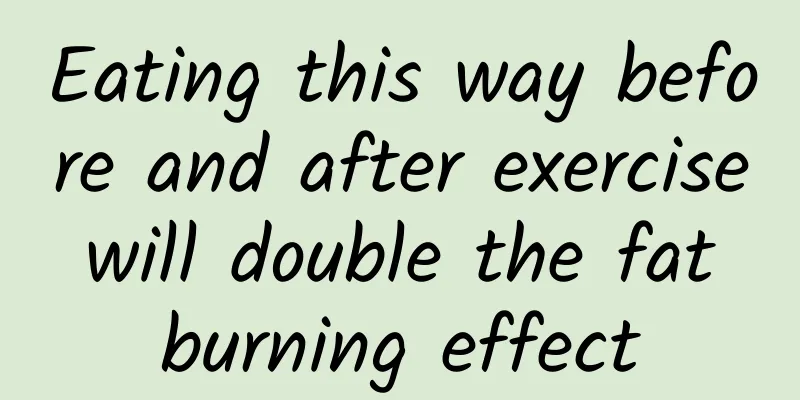Eating this way before and after exercise will double the fat burning effect

|
Before exercise, you should consume an appropriate amount of carbohydrates and vitamins, and avoid foods that produce gas, such as sweet potatoes, potatoes, onions, cauliflower, cabbage, red and white radishes, etc. Fats and meat take longer to digest, so they should be consumed at least four hours before exercise. It is worth mentioning that drinking a small cup of sugar-free black coffee one hour before exercise can help fat metabolism. Because caffeine can stimulate metabolism, it also stimulates the central nervous system, speeds up the heartbeat and blood circulation, and allows you to be more focused and persistent during exercise. What to eat during exercise? During 1-2 hours of endurance exercise, special attention should be paid to water replenishment to maintain appropriate blood sugar levels and delay the onset of fatigue. It is best to replenish water at room temperature, and in small amounts and multiple times. On average, replenish 100-200cc every 10-15 minutes. In addition, water intake should not exceed 800cc per hour, otherwise the liquid will remain in the stomach and may cause discomfort. What to eat after exercise? Eating after exercise should be done within half an hour after the exercise, and the interval should not be too long. Studies show that the longer you wait to eat after exercise, the worse the weight management effect. A human experiment found that eating half an hour after exercise can reduce body fat by 25% compared to 4 hours later! Supplementing with appropriate protein can suppress hunger because when protein is absorbed, it sends a signal to the brain to let the brain know that it is full. When you supplement with enough protein after exercise, it can also satisfy hunger and avoid overeating. In addition, there are medical tests that drinking 450c.c. of unsweetened high-fiber soy milk within 30 minutes after exercise can help increase muscle mass and make it less likely to gain weight again. However, it is important to note that soy milk is rich in soy isoflavones and the recommended daily intake should not exceed 900cc. Excessive intake may cause sequelae such as gynecomastia and increased uric acid. People with poor kidney function should be more careful when drinking so as not to increase the burden on the kidneys. This article is from Paston Publishing's "7 Days to Lose Weight Healthy and Keep Fat Without Gaining Weight Again!" 》 |
<<: Korean actress loses weight by eating only protein, doctor says beware of cholecystitis
>>: 10-minute full body fat burning exercise coach will help you lose fat
Recommend
What are the symptoms of cervical warts?
What are the symptoms of cervical warts? Cervical...
Experts briefly analyze the common classification of cervical erosion
According to the time of occurrence of cervical e...
Women must take precautions against pelvic inflammatory disease
Pelvic inflammatory disease is a common gynecolog...
How to determine whether there is an ectopic pregnancy?
How should we judge ectopic pregnancy? Ectopic pr...
Can endometrial tuberculosis be detected by B-ultrasound?
Among genital inflammations, endometrial tubercul...
People with high body fat, "puff tribe", beware of the new three highs
Are you a "puff person" with high body ...
Physical and chemical factors can cause acute cervicitis
Female cervicitis can be divided into acute and c...
Traditional Chinese medicine Shugan Sanjie decoction can effectively treat uterine fibroids
Traditional Chinese medicine Shugan Sanjie decoct...
The main cause of multiple uterine fibroids. Will multiple uterine fibroids cause menstrual bleeding?
Multiple uterine fibroids are a common disease am...
What are the symptoms of ovarian cysts and what causes them
What are the symptoms of ovarian cysts? What caus...
What are the causes of early miscarriage?
Early miscarriage may be caused by genetic inheri...
What are the typical symptoms of chronic cervicitis?
Cervicitis is a common disease, and chronic cervi...
Losing weight is so difficult! How to treat lower body obesity?
Many female office workers sit for long periods o...
How to prevent uterine fluid accumulation
If women have uterine effusion, improper treatmen...
Adnexitis may be caused by not paying attention to hygiene during menstruation
Adnexitis may be caused by not paying attention t...









